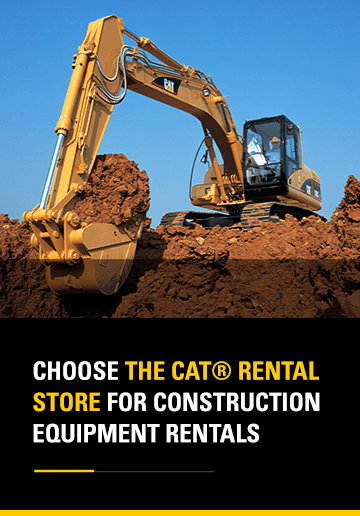
Why It's Essential to Do Your Research Before Renting Construction Equipment
Renting construction equipment is a convenient way to get access to the right machinery when you need it. Contractors need to stay flexible and be able to meet a variety of project needs from job to job. Renting is an easy solution that doesn’t require an expensive upfront payment to secure equipment. You also don’t need to be concerned with ongoing maintenance and other responsibilities that come with equipment ownership.
When renting construction equipment for your next project, it’s essential to do your research first. If you’re renting equipment for the first time, you might not know how to begin the equipment rental process or what questions to ask. For all contractors, there are six crucial things to consider before renting equipment. This guide can help you navigate some of these essential factors so you can get the best equipment from the best provider possible.
Jump to a section:
- You Need The Right Type of Equipment
- You Need The Right Size of Equipment
- You Need The Best Equipment For The Job Conditions
- You Need The Right Attachments and Accessories
- You Need Operators With The Right Experience
- You Need The Best Equipment For The Project
- Reasons To Find a Reliable Equipment Rental Company
1. You Need the Right Type of Equipment
When beginning the equipment rental process, you first need to have a solid understanding of the types of equipment available. There is a broad range of tools and machines that can perform a variety of general and specialized tasks. Without proper research, contractors may overspend their time and money trying to complete tasks with the wrong tools or with no tools at all.
By learning which types of equipment are available, you can save yourself valuable time, money and effort by using the right tool or machine from the start. Below are a few broad categories of equipment types and the applications for which they are best suited:
Aerial Equipment
Aerial equipment lifts the operator in a basket or on a platform so they can reach otherwise inaccessible areas. This category includes:
- Boom lifts: Boom lifts have telescoping and articulating booms that make them suitable for exterior building face work and other tasks like tree-pruning.
- Scissor lifts: Scissor lifts operate straight up and down and are ideal for interior or exterior work. Their work platform doubles as a workbench or spot to set your tools when working at height.
- Vertical personnel lifts: Vertical personnel lifts are smaller than scissor lifts and are suited for tight interior spaces. Because of their light weight, you can easily move them around by hand.
Compaction Equipment
Compaction equipment is used for tamping and compacting soil, dirt, sand and gravel to provide a stable foundation to build upon. These machines vibrate the soil, settling the particles to form a more stable surface. Air and water pockets get pushed out in the process, minimizing the chance of the ground shifting in the future.
Compaction equipment ranges from large compactors to create asphalt and concrete roads to smaller, man-operated tools like plate compactors and rammers.
Concrete Equipment
When pouring concrete for a driveway, new patio or a building foundation, it’s essential to have the right tools. You want the job to go smoothly and create a quality finished product. Concrete construction tools include mixers, core drills, power trowels and rebar saws. All these solutions help ensure you mix the concrete properly, pour it quickly and finish it with precision.
Earthmoving Equipment
Earthmoving equipment includes essential equipment like backhoes, compact track and wheel loaders, skid steer loaders, dozers and more. When you need to efficiently move large amounts of earth, including dirt, sand, gravel and rock, these machines are always up to the task.
For smaller residential work, compact track and skid steer loaders are ideal. For bigger jobs that require materials to be transferred over farther distances, wheel loaders are usually best. If the project requires you to first clear the ground of all debris, including trees, shrubs and rocks, dozers are the machine for you.
Forestry and Landscaping Equipment
Forestry machines are ideal in situations where large numbers of trees need to be cut down, de-limbed and stacked neatly for transportation. Common landscaping equipment includes trenchers, which are used to dig trenches. Other tools, like stump grinders, efficiently grind up tree stumps in minutes.
Material Handling Equipment
Material handling equipment is often used when materials, appliances and other heavy objects need to be moved or lifted in spaces that don’t permit access to larger machines. The equipment allows workers to safely and easily transport and lift objects and materials into place to perform their work. It helps save time, money and effort during a wide range of tasks.
Power Generation Equipment
Power generation equipment is ideal for locations that don’t have electrical facilities installed or when those facilities aren’t operational. This can be useful during construction projects or even during and after storms and other natural disasters. Power generation includes generators to produce electricity and light towers that illuminate large areas around the clock.
Roadwork Equipment
Roadwork equipment makes quick work of creating and remediating concrete and asphalt roads. Road reclaimers peel back old road surfaces before new surfaces can be poured. Asphalt pavers lay down consistent amounts of asphalt to ensure new road surfaces are smooth and even.
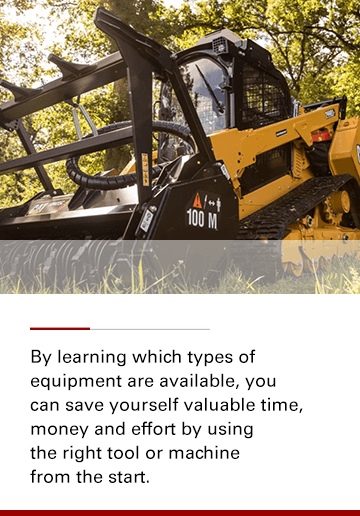
2. You Need the Right Size of Equipment
Once you pinpoint the type of equipment you need to complete your project, the next consideration is the size of the equipment. Physical size is one of the most important things to consider before renting equipment because most job sites are in areas with limited amounts of open space. You need to make sure your equipment can fit through doorways and around hallways if you’re working indoors. You also need to check operation clearances to ensure you can operate the equipment effectively in the space available.
When working outdoors, there is often more leeway with space, giving you the option of upsizing your equipment so you can get the job done faster. It’s also important to consider the surfaces you are working on. Larger equipment is heavier, meaning it will sink into softer surfaces like mud and dirt easier. In these areas, smaller equipment might be able to move over the surface better.
When selecting a piece of equipment, it’s essential to determine how much power you’ll need. With smaller tools, like drills, compactors and concrete mixers, you need to make sure you rent a tool with enough power to perform the task. It’s usually better to rent a tool that’s a little oversized rather than undersized when it comes to power.
For earthmoving equipment, like skid steers, compact track loaders and wheel loaders, the power requirement is less of a consideration for hauling material, such as soil, in the front bucket. Power is a larger consideration when using attachments, like augers, trenchers and tillers, which all demand more power from the machine compared to buckets alone.
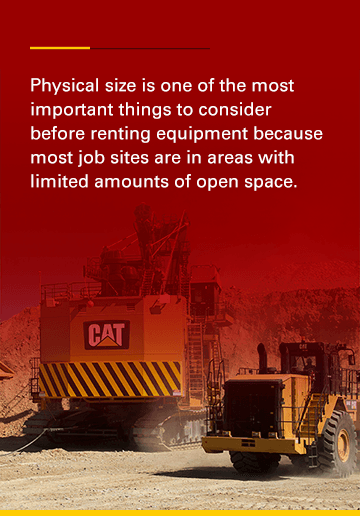
3. You Need the Best Equipment for the Job Conditions
Before renting equipment, you need to consider the terrain, climate and job site areas. Many machines, like compact loaders and excavators, come with either wheels or tracks. Although both options move the machine sufficiently on stable, flat terrain, you need to think about situations where your working environment might change.
Tracked machines distribute the machine’s weight over a larger surface area, making it more capable of operating on softer ground, like mud, dirt and frozen ground, without sinking in and getting stuck. This is an advantage in the winter when the ground conditions might be uncertain. Tracked machines also usually have a lower center of gravity, allowing them to operate safer with better traction on steeper slopes.
Choosing between rubber or steel tracks is also an important decision, as rubber tracks are much quieter and tend to cause less damage to the ground surface. Preventing damage is crucial when operating on freshly paved roads or turf.
Wheeled machines usually travel at faster speeds, especially in the case of wheel loaders, which can reach up to 25 mph. Wheeled machines are also quieter, which is a benefit in residential areas that are more sensitive to noise. If you require a machine to travel longer distances between sites, the wheel loader is an excellent option with a wide range of attachments available.
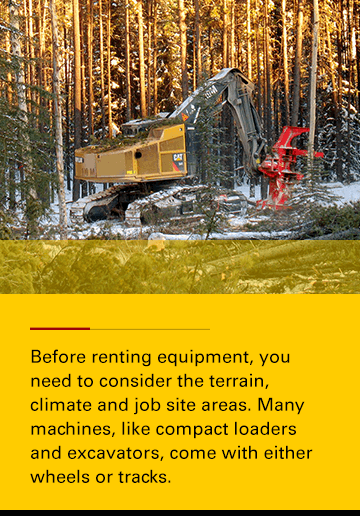
4. You Need the Right Attachments and Accessories
Another essential factor in researching construction equipment rentals is the work tool compatibility. The range of attachments available for heavy equipment is truly impressive. From agriculture to construction to mining to forestry, there is an attachment that can make your job easier.
Earthmovers like skid steer loaders, wheel loaders and track loaders typically come with a bucket as their standard attachment. However, they can be outfitted with attachments like:
- Augers: Augers drill into the ground to create a cylindrical hole. Typically, these holes are used for creating anything from fence posts to building foundations. Augers allow you to dig deep holes without uncovering large amounts of earth like you would while using a digging bucket.
- Backhoes: Backhoe attachments transform your machine into a mini excavator. This allows you to dig holes, pick up objects and fill up trucks with material effortlessly.
- Brooms: Brooms are highly useful attachments, especially during the spring when you need to clean up hard surfaces like concrete or asphalt. Their large bristles grab surface debris and sweep it back into the hopper for quick and efficient cleaning with limited dust.
- Compactors: Compactor attachments allow you to use your machine to pack the earth and create a solid surface. They’re convenient for establishing building foundations or any other structure requiring a stable surface.
- Mulchers: Mulcher attachments for landscaping cut low-lying shrubs, grass and trees and mix them into the earth below. This allows the operator to remove the surface vegetation while incorporating it into the soil. Mulching aids in decomposition and fertilizes the soil.
- Saws: Saw attachments add one more dimension of usefulness to your machine by enabling it to cut precision trenches into solid ground. Whether you need a trench to bury utility lines or a sprinkler pipe, saw attachments can do the job quickly and efficiently.
There are many more work tools available for general and specialty applications. Consult your local rental expert for help researching the right attachment for your next job.
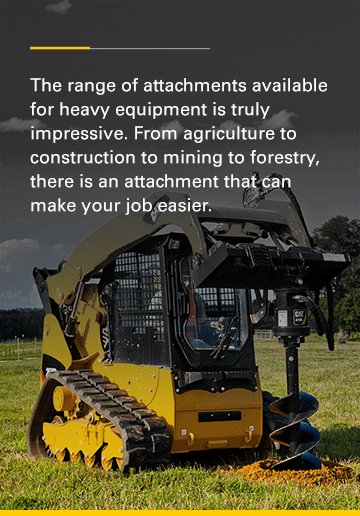
5. You Need Operators With the Right Experience
Though it may be overlooked, one of the most important things to consider before renting equipment is your operator's experience level. Compact equipment, like skid steer loaders, compact track loaders, multi-terrain loaders, compact wheel loaders and mini excavators, are fairly easy to handle. Their small size can make them safer for inexperienced operators on construction sites. They’re also designed to be intuitive and require little training. With a tutorial from a customer service representative, you can likely get your compact equipment rental up and running promptly.
Heavy construction equipment, like full-size wheel loaders, dozers or excavators, require more experienced operators. They’re bigger, heavier and usually have poorer operator visibility due to these factors. This makes them more dangerous to operate around people and structures. For safety reasons, you’ll need to research the types of operator training and certifications that are best suited for heavy-duty construction equipment.
Knowledgeable rental service representatives can help you determine what level of operator experience is required for the model you have in mind. Many rental providers also offer operator training solutions to help contractors maintain safe and smooth-running operations.
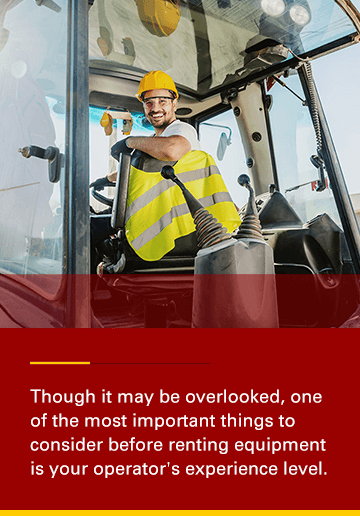
6. You Need the Best Equipment for the Project
When researching rental equipment and equipment providers, you want to make sure the company you choose can help you achieve your project goals. In the fast-paced construction industry, maximizing your bottom line is crucial. You need to get your work done as quickly as possible without compromising quality. You also need to keep operating costs down and mitigate risk as much as possible. Renting high-performance equipment that’s been well-maintained ensures you won’t suffer unnecessary losses from breakdowns and downtime that eat into your profit margins.
Your reputation with local clients depends on your ability to deliver projects on time and on budget. Having access to the right equipment at the right time is fundamental to achieving this goal. The right model needs to be ready when you need it and available for the entire amount of time you need it.
You need to secure an affordable yet high-performing rental from a provider who can arrive on-site quickly with part replacements or to perform repairs if anything breaks down. Spending time researching rental providers who provide this assurance can put your mind at ease when it comes time to begin operations.
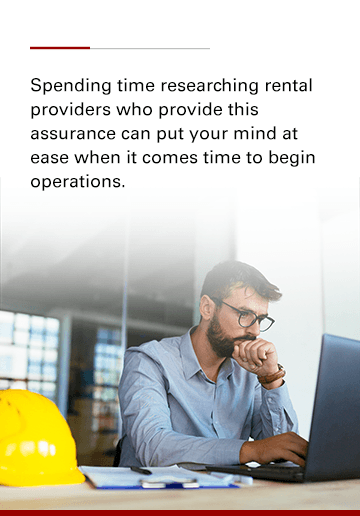
Reasons to Find a Reliable Equipment Rental Company
When researching before renting construction equipment, it’s just as essential to consider who you’re renting from as it is the type of equipment to rent. In narrowing down your search for the ideal rental partner, consider these five factors that make up a reliable and trusted service provider:
1. Well-Maintained Equipment
A reputable rental provider is committed to preventive maintenance on their inventory. Whether it’s heavy-duty or compact construction equipment, machines are complex and require ongoing maintenance and servicing to stay in peak performance. Top rental companies allocate a significant portion of their budget to ongoing servicing and fleet maintenance. This allows them to guarantee their products will perform for clients.
When choosing a rental provider, ask about their preventive maintenance activities, including:
- How often the equipment undergoes routine inspection and maintenance
- Whether they install manufacturer-certified parts that are guaranteed to perform
- What type of maintenance interval they follow and whether it’s based on the manufacturer’s recommendations
- How technology is used to conduct predictive maintenance to make necessary replacements as issues arise
It’s vital that this preventive maintenance is performed by certified technicians. Inexperienced mechanics who aren’t familiar with the machinery or the manufacturer may not be able to guarantee their service as well as highly trained technicians.
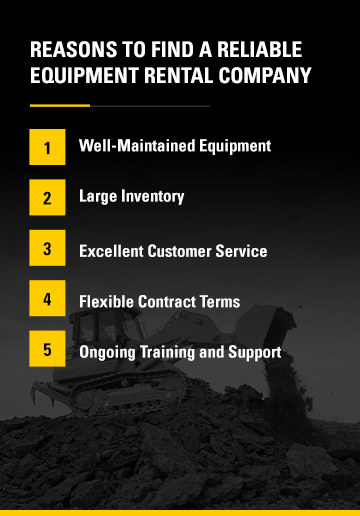
2. Large Inventory
When choosing a rental service partner, you want peace of mind knowing the equipment you need will be available when you need it. Whether it’s a common and popular piece of equipment like a skid steer loader or excavator, or it’s a specialized machine like an asphalt paver or a compactor, you want a rental company who can provide the exact model and size of equipment you need without compromise.
Top construction equipment rental companies have a massive inventory of work tools to choose from. They have the exact attachments you need to perform a wide range of duties so you can maximize output. A broad inventory of work tools also includes specialty work tools and couplers to ensure compatibility with your chosen equipment type.
Elite companies have large networks through which they can obtain the equipment as needed. If they don’t have the model you need at one location, they can quickly source it and have it ready for you at the time of project startup.
3. Excellent Customer Service
Excellent customer service is crucial when working with rental equipment dealers. Contractors think of their rental providers as partners who can help them fulfill their projects and earn new or repeat contracts. A rental provider who considers themselves your business partner provides top customer service levels.
Some of the points that make up a good customer service team include:
- Fast response to your inquiries and requests
- Extra-mile service to help you find the equipment and work tools you need
- Flexible terms that fit your unique project needs
- Thorough product knowledge and ability to answer your product-related questions
When researching the right rental provider for you, ask what you can expect from their customer service department. Can you reach them by phone, email and online? What are their store hours like? Will you have a representative you can rely on? The more available the customer service team is, the better the experience may be for you.
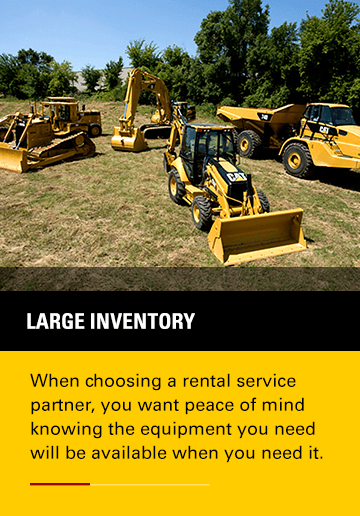
4. Flexible Contract Terms
Construction projects differ in size and scope, meaning you need a rental provider who can stay as nimble as your company does. Reputable rental providers work with their clients to put together flexible, affordable rental agreements that meet the contractor’s needs.
Whether you need short-term rentals for daily or weekly projects, or you need long-term monthly contracts or longer, a dependable provider will work with you. They’ll also have the flexibility to extend contracts if unforeseen delays occur and you need to keep the machine longer to get the job done.
When searching for the best rental partner, ask potential suppliers about their contract terms. Make sure their agreements are fair and that they can meet your needs throughout the contract term and beyond.
5. Ongoing Training and Support
A sign of a trusted service provider is their ability to provide upfront training and ongoing support. When renting construction equipment for the first time, it’s crucial you get expert-level guidance on how to operate the equipment, both for safety and productivity reasons.
A trustworthy service partner can walk you through basic operations and show you how to work with the machine safely. They’ll also be available to answer your questions if you need their help as you get started.
Many rental providers also have the ability to offer 24/7 emergency response service. If breakdowns occur or issues arise, a customer service team is available to answer your questions or dispatch part replacements and maintenance servicing. Always choose a partner who will provide ongoing training and support so you can continue to be successful throughout your project.
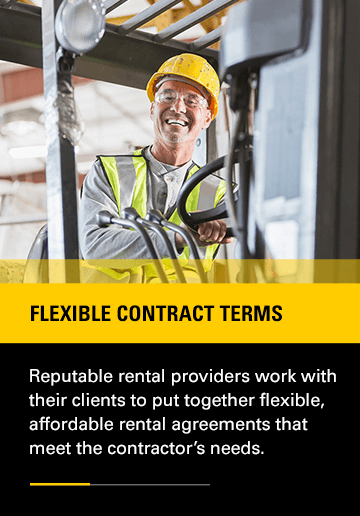
Choose The Cat® Rental Store for Construction Equipment Rentals
Conducting thorough research before settling on a rental provider is vital to getting the best deal, the most reliable equipment and the most efficient tools for the job. By choosing The Cat® Rental Store, you can find the right model when you need it and trust that it's ready to perform heavy-duty jobs.
With more than 1,300 locations around the world, The Cat Rental Store has a massive selection of construction equipment rentals near you. Our knowledgeable dealers can guide you on how to begin the equipment rental process. With their support, you’ll be able to select the right type and size of equipment and the ideal work tools for the job.
Visit a nearby location today or give us a call at 1-800-RENT-CAT for more information.
Find The Cat Rental Store Near You